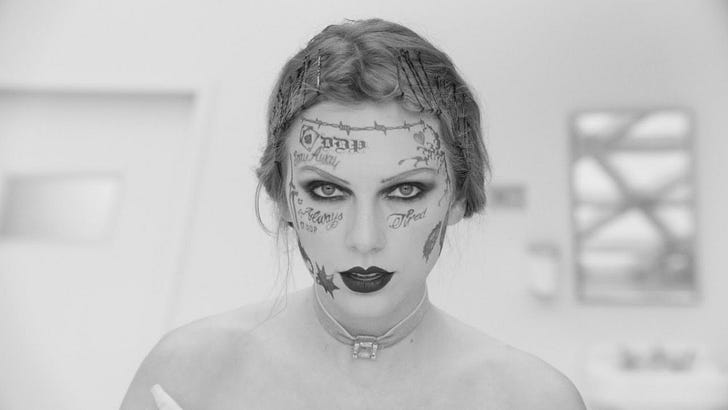It’s a Tox Report life vs art special this week! (Final scores as follows: life 1 art 0, life 0 art 1, and a big old no score draw.)
For last weekend’s Sunday Times, I reviewed a book called Sluts that was so bad I considered spiking my own piece and telling the publisher they needed to pull it, although fortunately I came to my senses and put away my high horse before I sent that email. It’s easy (and also very enjoyable) to pull apart a book this drossy, but there’s also a serious point about about quality control in publishing.
Sluts feels extremely rushed — so rushed that not only do several sections narrowly skirt the definition of plagiarism, they also introduce their own entirely crackers errors that weren’t in the source text. The Bookseller announcement is from 26 January this year, and though I’m sure Sluts wasn’t written that fast, I’m not sure how you produce something this faulty while taking much longer.
Plus for UnHerd: I took a look at the weird, unintentional alliance of Judith Butler and Simon Baron-Cohen that helped birth gender theory. And on newsstands: this month’s issue of the Critic, with an extended play version of my thoughts on Bey’s bad “Jolene”.
Listened
Taylor Swift, The Tortured Poets Department: Anthology Edition
I think I was about five songs in when I realised this actually wasn’t going to get better. I’ve listened to Tortured Poets a few times over now, and can sadly report that not one song has left a mark. There’s no hook I find myself absentmindedly singing (there are no hooks full stop), no lines that have lodged in my brain to demand dissection, no insistent bits of melody that have me going back for more. Just 31 (thirty! one!) samey midtempo tracks that sound more like halfhearted impressions of a Taylor song than they do like actual songs.
Since her initial trio of country-pop albums, every Swift record has been a reinvention: the introduction of full-throttle Max Martin pop on Red, the glittery synths of 1989, the electro attack of Reputation, the girly rebirth of Lover, the tender americana of Folklore and Evermore (really one album IMO), and the dreamy precision of Midnights. Every song on those records could only be on that record, and every one of those records pushed Taylor’s songwriting and her persona to somewhere new. And it’s been exciting to travel with her. Till now.
Tortured Poets isn’t a development: it’s a dwindling. Her partnership with songwriter/producer Jack Antonoff, who’s been her primary collaborator since Lover, appears to have attained its sludgy final form. “Never mind splitting from Joe Alwyn and Matt Healy,” joked one of my friends. “Jack Antonoff is the breakup she needs.” And maybe breakups aren’t the muse they used to be for her. When you find yourself needing to reactivate an eight year old beef with Kim Kardashian for material, you should admit the well is dry. (Also, the “coded” capitals in the title of “thanK you aIMee” give me very strong “primary school bully” vibes. Why not go all the way and write WHORE on Kim’s lunchbox in glitter pen?)
For nearly two decades, Taylor Swift’s great project has been using music to play out the relationship between “Taylor Swift” the songwriter, “Taylor Swift” the tabloid presence, and a third implied but inaccessible Taylor Swift who doesn’t take quote marks. Midnights was probably the high water mark of her artistic self-consciousness: after “It’s me, hi, I’m the problem it’s me”, how do you go back to eviscerating exes for sport? On “But Daddy I Love Him”, when she complains about fans judging her relationships,1 it comes off hollow and petty: if you didn’t want your audience to care about your lovelife, you could simply stop trailing the breadcrumbs.
My suspicion (and I guess we will be able to see in a few weeks if I’m wrong) is that the strong early play for Tortured Poets will fade fast — as I write this, it hasn’t bumped “Cruel Summer” from the top of her “popular” chart on Spotify. There’s a chance this will be her first “failure”, in an extremely relative sense given it’s already broken streaming records, but still a failure if her intention is to constantly exceed her own standards. What Taylor does when faced with a failure (and not the phony failure she cast Reputation as for narrative purposes; see Tox Report 28) is, potentially, the most interesting point in her career since 1989.
Watched
Baby Reindeer (Netflix)
Baby Reindeer is very, very good TV — you can describe it roughly as “boy Fleabag”, inasmuch as it’s based on a one-person show about the most desperate, shameful parts of a character’s psyche. Except, because boys are infinitely weirder than girls (sorry but it’s true), while Fleabag’s big revelation was (spoiler) “kissed my best friend’s boyfriend”, Baby Reindeer’s is “encouraged a terrifying stalker in a weird folie a deux” and that isn’t even really the big revelation because you get it in the first episode. Oh, and it’s autobiographical: the predicament of the character Donny is based on the real-life experiences of writer/star Richard Gadd.
This is where it gets sticky, because while Baby Reindeer has received lots of (deserved) praise for its portrayal of a victimised man, there is a fundamental problem with Gadd’s decision to make the show. If you have ever been stalked (it’s me, hi, but don’t worry, it was only a minor stalking), you will know that there’s one piece of advice victims are given: do not engage with the stalker. Stalkers are embroiled in a one-sided relationship with their victims, and anything the victim does in response can be taken as perpetuating that relationship. That goes for sending emails asking them to stop, telling them to fuck off — or making a Netflix show about them.
Predictably, internet detectives have identified IRL candidates for the characters in Gadd’s show. Some tenuous, some very convincing; I’m not sharing any of them here because, come on, this is all kinds of messed up. But you can only imagine that this is a stalker’s fantasy: yeah he says he doesn’t care, but he’s made a limited series about me, and now everyone’s discussing it! So I find myself in the weird position of fully recommending a show I’m fairly sure should never have been made. The conceit of Baby Reindeer is that only someone who’s had a thorough reckoning with their demons could make it. The fact that Baby Reindeer exists at all suggests to me that all Gadd’s demons are very much intact and screaming for attention.
Read
Stephen Beachy, “Who is JT Leroy? The True Identity of a Great Literary Hustler” (New York Magazine)
A throwback to the truly wonderful moment in 2005 when everyone suddenly realised that there was something fishy about JT “Jeremiah Terminator” LeRoy, HIV-positive transsexual child prostitute turned avant garde author who would only communicate by phone, email or fax. (How did a child prostitute turned avant garde author get a fax machine? It was a gift from a trick, and LeRoy plugged it in at public restrooms, which apparently no one found the idea of a restroom with a phone jack weird.)
This is my favourite kind of grift, I think, because although the inventor of LeRoy put a huge amount of effort into sustaining the fiction (including taping lengthy false therapy sessions), the craft of the con was all in giving people what they wanted. The cool kids ate LeRoy up. Garbage wrote a song about him. Billy Corgan wanted to hang out. Tom Waits interviewed him. Lou Reed blurbed him. It was all just so deliciously Andy Warhol — and maybe the sunglasses and blonde fright wig worn by Savannah Knoop in character as LeRoy was supposed to enhance that.
I should count myself among the taken in, because I bought LeRoy’s supposedly autobiographical debut Sarah in 2000 (a purchase based, I believe, on coverage in the Face (RIP)). Knoop did not write Sarah, and only played the part of LeRoy when a physical stand-in was necessary: the real architect was Knoop’s sister-in-law, a thirty-something mother called Laura Albert who looked more Lilith Fair than Factory.
Without the LeRoy mythos, Sarah is clearly a lot of southern gothic cliché and not much substance: “The boy, through spit-wet eyes, told him a tale of love” etc etc etc. No one wants to hear that from a mom. Your creative writing tutor would send you back with an injunction to “write what you know”. An unambitious person would take the advice. A genius would reinvent herself as an underage truck stop hooker.
Albert (as I know from my inbox) gets very flinty if you call LeRoy a hoax. “JT was not a joke or a prank or a stunt, and to call what happened a hoax is dismissive of my fiction and the complexities involved,” she wrote to me in an email in 2017 after I’d made a casual aside about the LeRoy story somewhere. In other words, LeRoy might not have been factual, but he was real: by the time she emailed me, Albert identified herself as somewhere on the genderfluid spectrum, which of course made LeRoy less a fabrication and more an expression of her essential identity.
But I was sorry that she insisted on authenticity after all her adventures. The most delicious thing about LeRoy — Albert’s greatest work of art, far moreso than Sarah or its followup — was that a normie-looking woman with no connections blagged her way into the very middle of the art world by exploiting the identity-blurring powers of digital communication. I don’t want the version where Albert was “living her truth”; I want the one where she was making everyone else eagerly play along in her lie.
Gimme, gimme more…
I was writing about Courtney Love this week, and let me tell you, the lore runs deep. There were whole episodes I’d forgotten that would be enough incident for a less extra lifetime — including the story of her years in Liverpool, pursuing Julian Cope and trying to write synth-pop songs about porridge.
I can’t say this interview with French filmmaker Maïwenn about directing and costarring with Johnny Depp in his post-cancellation comeback movie made me want to see the film, but God I’d love to hear the tape. “Maïwenn uses her hand to mimic a snake” is my new gold standard for an interview going south.
Whatever misfortunes befall me this week, I’m just going to be grateful I didn’t end up accidentally owning 90 percent of all octopuses in Oklahoma.
Sia x Paris Hilton is very much “Sia does her song”, but you know what? It’s a good song.
Specifically “Sarahs and Hannahs in their Sunday best/ Clutching their pearls, sighing ‘What a mess’,” so I guess I’m now in pop music name jail along with all the Beckys from Beyoncé’s Lemonade.





Haha I felt shamed for having this name too when I heard that song on TS’s new album 😆